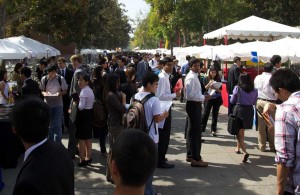Students seek jobs outside of major, minor
With the largest turnout of hiring companies since the economic downturn in 2008, students focused on securing a job at Thursday’s career fair, rather than finding a job that pertains to their major.

Job search · The Career Center said more than 170 companies were represented at the fair Thursday, the most since the recession began. - Ralf Cheung | Daily Trojan
More than 170 companies looked for applicants with a variety of academic backgrounds.
Chanel Kaufman, a representative from U.S. Bank, said U.S. Bank was looking for applicants with strong leadership skills rather than specific academic qualifications.
“We are less concerned about a student’s major and more concerned with their leadership potential and previous experience in customer service and retail,” Kaufman said.
Carl Martellino, executive director of USC’s Career Planning and Placement Center agreed that a student’s major is only important in more specialized fields like medicine and engineering, but it is never too late to acquire specified technical skills.
“Technical jobs require a more specified track, including major and internships,” Martellino said. “If you get an undergraduate in philosophy, you can still go for a graduate degree in engineering.”
Martellino also said the size of the career fair is a sign that the job market for USC students and graduates is once again expanding.
“This big career fair is a terrific sign that things are looking up,” Martellino said.
The career fair included corporations such as Apple, Microsoft, Farmer’s Insurance and U.S. Bank, as well as non-profit organizations like Teach for America and the Japanese Exchange and Teaching program.
Some domestic students said their goal at the career fair was to find a job regardless of its pertinence to their major.
“I am looking for a paid job related to my major,” said Jensen Vollum, a senior majoring in economics. “But considering the job crunch, I will take what I can get for now. I am keeping my options open about what could eventually become my career.”
For international students, stakes were higher because finding a job is often a matter of maintaining a visa to remain in the United States.
“An internship or a paid position related to my major would give me a good chance to grow but would also secure my ability to stay in the [United States],” said Jeewon Yang, a Korean student majoring in public policy, management and planning. “Visas for international students expire a year after graduation and the only way to continue working here is to be sponsored by a company that you work for.”
Some international students find it difficult to get company sponsorship because the process requires a lot of time and money for companies.
“If they can get an American student with comparable skills and avoid the hassle of sponsoring us, most companies will do so,” Yang said.
Most of the companies at the career fair invited applications from all majors.
“A student majoring in one field is not more likely to be hired than another,” Martellino said. “Previous work experience, internships, classes with a specific emphasis and GPA all come into play when a company is considering an applicant.”
